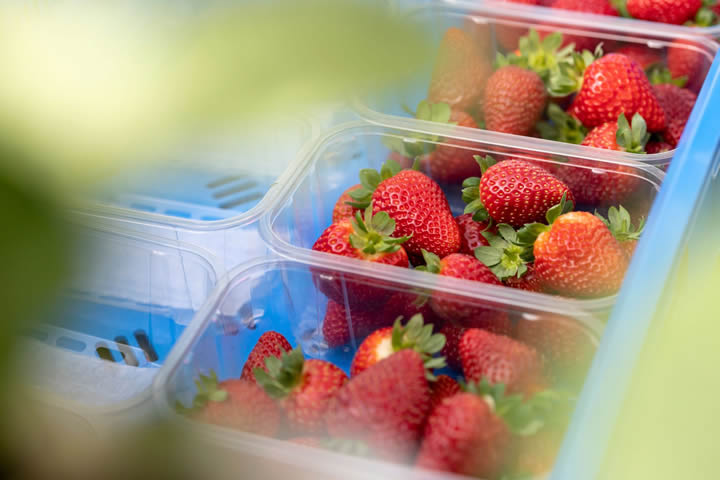AppHarvest opens 30-acre high-tech indoor farm to grow strawberries and cucumbers in Somerset, Ky.

AppHarvest, Inc. (NASDAQ: APPH, APPHW), a sustainable food company, public benefit corporation and Certified B Corp building some of the world’s largest high-tech indoor farms to grow affordable, nutritious fruits and vegetables at scale while providing good jobs in Appalachia, today opened its Somerset, Ky., 30-acre high-tech indoor farm that will grow strawberries and cucumbers and confirmed it has begun commercial shipments of strawberries.
The AppHarvest Somerset farm is designed to grow nearly one million strawberry plants at a time, which are expected to produce for about eight months of the year. AppHarvest is growing WOW® Berries for its customer, Mastronardi Produce. The crop is expected to alternate seasonally with English cucumbers.
The AppHarvest Somerset controlled environment agriculture (CEA) facility is designed to leverage sunshine and rainwater boosted with technology when needed and is automated for lighting, humidity and temperature. The farm uses a closed-loop irrigation system, which enables expected water savings of up to 90 percent compared to open-field farming and allows for precision dosing of nutrients, resulting in far less use of fertilizer compared to open-field farming while avoiding pollution from agricultural runoff.
The high-tech farm also features a blast chiller that rapidly lowers the temperature of harvested strawberries prior to packaging to extend shelf life. With its central location in Appalachia, AppHarvest is within a single day’s drive of about 70 percent of the U.S. population, which helps reduce energy consumption required to transport the produce and is a key benefit with more highly perishable crops, such as strawberries, to deliver them fresh and with a longer shelf life.
“The AppHarvest team has set a new bar in the controlled environment agriculture sector by bringing these new high-tech farms online quickly and by diversifying our crops to add washed-and-ready-to-eat salad greens and strawberries to our current tomato offering,” said AppHarvest Founder & CEO Jonathan Webb. “We are eager to see these new farms start generating revenue for the company while they help build a climate-resilient, more sustainable domestic food supply providing good jobs in the U.S.”
With the Somerset farm opening, AppHarvest now has three farms shipping produce to national customers this fall. Last week, AppHarvest announced the opening of its Berea salad greens farm, which is opening on a phased approach and will have the capacity to grow about 35 million lettuce plants at a time, with such capacity renewing every three to four weeks. The AppHarvest Morehead farm expects to begin its third harvest shortly, and the company expects to start planting the new 60-acre Richmond tomato farm in November. The AppHarvest Richmond farm is expected to double the company’s tomato capacity, and—combined with Morehead—we expect AppHarvest to be able to grow nearly 1.5 million tomato plants at a time.
With four farms expected to be operational this year, AppHarvest has entered a new business stage. To enable stronger performance at this increased scale, the company has bolstered its board with CEA industry veteran Tony Martin and Appalachian Regional Healthcare CEO Hollie P. Harris. Food sector veteran David Lee will continue on the board, stepping down from his management role as president.
“We are fortunate with our mission-based work to have access to Tony with his deep CEA experience. I am incredibly proud of the accomplishments the AppHarvest team has made in getting our four-farm network in place to generate new revenue streams from a diversified set of crops since the board asked me to take on the role of president to support the organization’s journey as a public company. I look forward to continuing to serve as a board member and to support this team and this mission to improve food security with a climate-resilient solution that provides good jobs in Appalachia,” said David Lee.
The need for domestic CEA
According to USDA reports, the value of U.S. fruit and vegetable imports rose to a record level in 2021 and has been projected to keep increasing in 2022. Changing weather patterns—ranging from mega-drought in the Southwest of the U.S. to more frequent flooding to catastrophic wind events—are making it harder than ever for open-field farmers to predict the duration of their growing seasons and to have conditions that result in a quality harvest. Major food retailers have demonstrated increasing interest in high-tech indoor farms for their ability to de-risk fruit and vegetable production with a more climate-resilient, more sustainable year-round growing solution that uses far fewer resources. Europe, a pioneer in the industry, is estimated to have nearly 520,000 acres of CEA production compared to an estimated 6,000 acres in the United States.
About AppHarvest
AppHarvest is a sustainable food company in Appalachia developing and operating some of the world’s largest high-tech indoor farms with robotics and artificial intelligence to build a reliable, climate-resilient food system. AppHarvest’s farms are designed to grow produce using sunshine, rainwater and up to 90% less water than open-field growing, all while producing yields up to 30 times that of traditional agriculture and preventing pollution from agricultural runoff. AppHarvest currently operates its flagship farm – about the size of 50 football fields – in Morehead, Ky., producing tomatoes. The company is developing a network of farms to produce a variety of vine crops, salad greens and berries. The four-farm network that is expected to be operational by the end of 2022 consists of 165 acres. For more information, visit https://www.appharvest.com/.
Comments (0)
This post does not have any comments. Be the first to leave a comment below.
Featured Product

